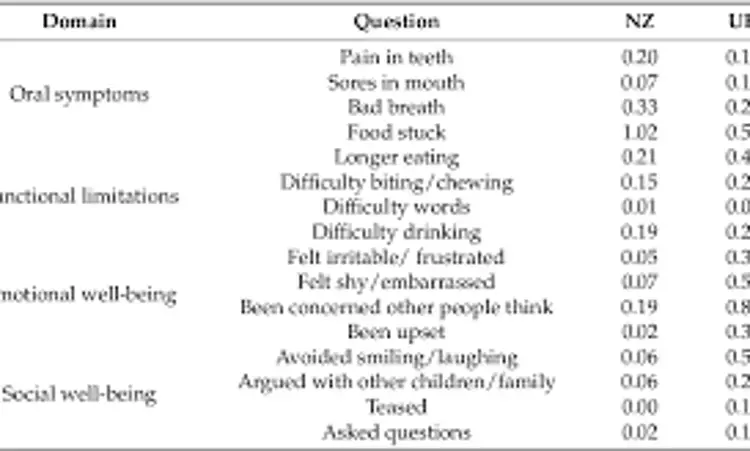- Home
- Medical news & Guidelines
- Anesthesiology
- Cardiology and CTVS
- Critical Care
- Dentistry
- Dermatology
- Diabetes and Endocrinology
- ENT
- Gastroenterology
- Medicine
- Nephrology
- Neurology
- Obstretics-Gynaecology
- Oncology
- Ophthalmology
- Orthopaedics
- Pediatrics-Neonatology
- Psychiatry
- Pulmonology
- Radiology
- Surgery
- Urology
- Laboratory Medicine
- Diet
- Nursing
- Paramedical
- Physiotherapy
- Health news
- Fact Check
- Bone Health Fact Check
- Brain Health Fact Check
- Cancer Related Fact Check
- Child Care Fact Check
- Dental and oral health fact check
- Diabetes and metabolic health fact check
- Diet and Nutrition Fact Check
- Eye and ENT Care Fact Check
- Fitness fact check
- Gut health fact check
- Heart health fact check
- Kidney health fact check
- Medical education fact check
- Men's health fact check
- Respiratory fact check
- Skin and hair care fact check
- Vaccine and Immunization fact check
- Women's health fact check
- AYUSH
- State News
- Andaman and Nicobar Islands
- Andhra Pradesh
- Arunachal Pradesh
- Assam
- Bihar
- Chandigarh
- Chattisgarh
- Dadra and Nagar Haveli
- Daman and Diu
- Delhi
- Goa
- Gujarat
- Haryana
- Himachal Pradesh
- Jammu & Kashmir
- Jharkhand
- Karnataka
- Kerala
- Ladakh
- Lakshadweep
- Madhya Pradesh
- Maharashtra
- Manipur
- Meghalaya
- Mizoram
- Nagaland
- Odisha
- Puducherry
- Punjab
- Rajasthan
- Sikkim
- Tamil Nadu
- Telangana
- Tripura
- Uttar Pradesh
- Uttrakhand
- West Bengal
- Medical Education
- Industry
Malocclusion Impact Questionnaire useful Tool for Assessing Malocclusion Impact on OHRQoL: Study

Researchers have found in a new research that malocclusion Impact Questionnaire is useful Tool for Assessing Malocclusion Impact on OHRQoL.The study highlights the effectiveness of the Malocclusion Impact Questionnaire (MIQ) in evaluating the impact of malocclusion on Oral Health-Related Quality of Life (OHRQoL) in orthodontics. The differences in OHRQoL between children with and without severe hypodontia (missing ≥5 teeth) were minimal. Delaying treatment until the patient expresses a subjective need may help prevent unnecessary treatments in children with hypodontia.
A study was done to assess the impact of malocclusion on oral health-related quality of life (OHRQoL) and to compare the impact of malocclusion in children with and without hypodontia. Children aged 10-16 years with ≥ 5 missing teeth and without hypodontia completed the Malocclusion Impact Questionnaire (MIQ) to assess the impact of malocclusion on OHRQoL. The Child Perception Questionnaire 11-14 years short form (CPQ11-14-ISF16) was used to verify the validity of the MIQ. Demographic and orthodontic data were collected. Internal consistency and validity of the MIQ were analyzed. MIQ scores were compared using an independent t‑test. Regression analysis was performed to identify predictors of the MIQ score. RESULTS: A total of 92 participants completed the MIQ, and 52 participants the CPQ11-14-ISF16. The MIQ showed excellent internal consistency (Cronbach's α 0.89) and good criterion validity with CPQ11-14-ISF16 (r = 0.58). No significant difference in the impact of malocclusion on OHRQoL between the groups (p = 0.15) was found. Age (p < 0.05), sex (p < 0.001), and general appearance (p < 0.001) significantly predicted OHRQoL scores in the regression analysis. Multilevel analysis showed that the group and age effects were nonsignificant and that sex and general appearance were predictive for the MIQ score. This study suggests that the MIQ is a useful tool to assess the impact of malocclusion on OHRQoL in the orthodontic field. Differences in the impact of malocclusion on OHRQoL between children with and without hypodontia of ≥ 5 teeth were limited. It may be beneficial delaying treatment until the patient expresses a subjective treatment need which may reduce overtreatment of children with hypodontia.
Reference:
Duisterwinkel, Farnaz, et al. "Impact of Malocclusion On Oral Health-related Quality of Life: Insights From Children With and Without Hypodontia." Journal of Orofacial Orthopedics = Fortschritte Der Kieferorthopadie : Organ/official Journal Deutsche Gesellschaft Fur Kieferorthopadie, 2025.
Keywords:
Malocclusion, Impact, Questionnaire, useful, Tool, Assessing, Malocclusion, Impact, OHRQoL, Study, Duisterwinkel, Farnaz
Dr. Shravani Dali has completed her BDS from Pravara institute of medical sciences, loni. Following which she extensively worked in the healthcare sector for 2+ years. She has been actively involved in writing blogs in field of health and wellness. Currently she is pursuing her Masters of public health-health administration from Tata institute of social sciences. She can be contacted at editorial@medicaldialogues.in.


